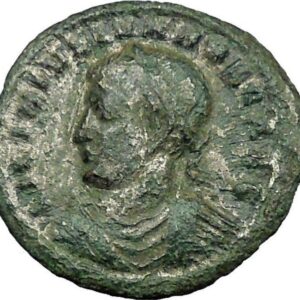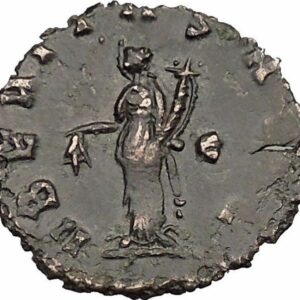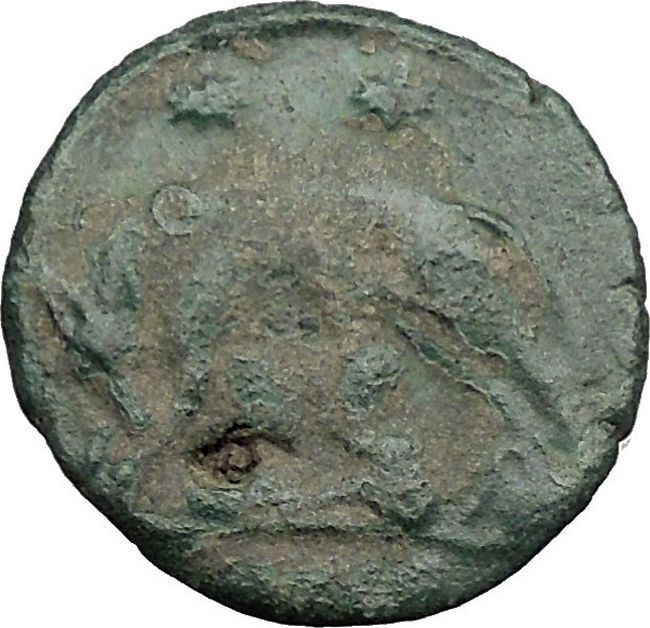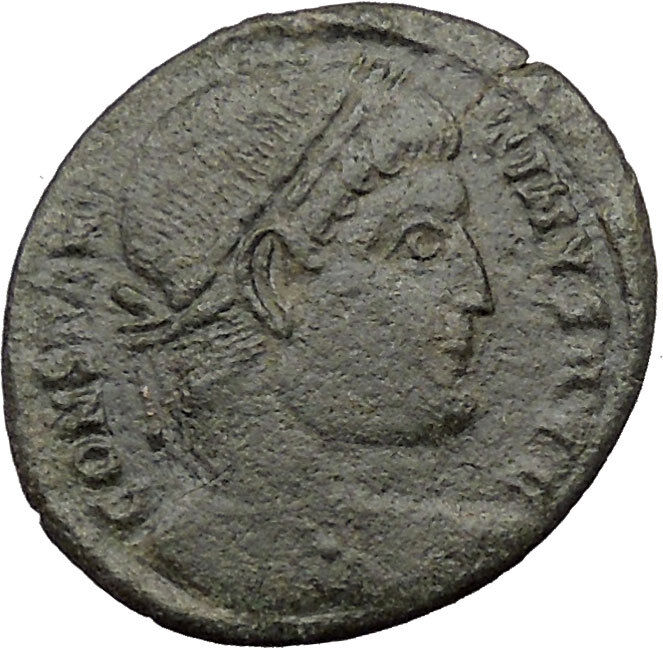|
Carinus – Roman Emperor: 283-285 A.D.
Bronze Antoninianus 22mm (2.90 grams) Tripolis mint, struck 283-284 A.D.
Reference: RIC 329; Sear 12363
IMP C M AVR CARINVS PF AVG, Radiate cuirassed bust right.
VIRTVS AVG G / TR/XXI, Carinus standing right receiving Victory on globe from Jupiter (or Carus); star above.
You are bidding on the exact item pictured, provided with a Certificate of Authenticity and Lifetime Guarantee of Authenticity.
 In Roman mythology, Jupiter or Jove was the king of the gods, and the god of sky and thunder. He is the equivalent of Zeus in the Greek pantheon. He was called Iuppiter (or Diespiter) Optimus Maximus (“Father God the Best and Greatest”). As the patron deity of ancient Rome, he ruled over laws and social order. He was the chief god of the Capitoline Triad, with sister/wife Juno. Jupiter is also the father of the god Mars with Juno. Therefore, Jupiter is the grandfather of Romulus and Remus, the legendary founders of Rome. Jupiter was venerated in ancient Roman religion, and is still venerated in Roman Neopaganism. He is a son of Saturn, along with brothers Neptune and Pluto. He is also the brother/husband of Ceres (daughter of Saturn and mother of Proserpina), brother of Veritas (daughter of Saturn), and father of Mercury. In Roman mythology, Jupiter or Jove was the king of the gods, and the god of sky and thunder. He is the equivalent of Zeus in the Greek pantheon. He was called Iuppiter (or Diespiter) Optimus Maximus (“Father God the Best and Greatest”). As the patron deity of ancient Rome, he ruled over laws and social order. He was the chief god of the Capitoline Triad, with sister/wife Juno. Jupiter is also the father of the god Mars with Juno. Therefore, Jupiter is the grandfather of Romulus and Remus, the legendary founders of Rome. Jupiter was venerated in ancient Roman religion, and is still venerated in Roman Neopaganism. He is a son of Saturn, along with brothers Neptune and Pluto. He is also the brother/husband of Ceres (daughter of Saturn and mother of Proserpina), brother of Veritas (daughter of Saturn), and father of Mercury.
 Carinus (Latin: Marcus Aurelius Carinus Augustus; died 285) was Roman Emperor from 283 to 285. The elder son of emperor Carus, he was first appointed Caesar and in the beginning of 283 co-emperor of the western portion of the empire by his father. Official accounts of his character and career have been filtered through the propaganda of his successful opponent, Diocletian. Carinus (Latin: Marcus Aurelius Carinus Augustus; died 285) was Roman Emperor from 283 to 285. The elder son of emperor Carus, he was first appointed Caesar and in the beginning of 283 co-emperor of the western portion of the empire by his father. Official accounts of his character and career have been filtered through the propaganda of his successful opponent, Diocletian.
Reign
He fought with success against the Germanic Quadi tribes, but soon left the defence of the Upper Rhine to his legates and returned to Rome, where the surviving accounts, which demonize him, assert that he abandoned himself to all kinds of debauchery and excess. More certainly, he celebrated the annual ludi Romani on a scale of unexampled magnificence.
After the death of Carus, the army in the east demanded to return to Europe, and Numerian, the younger son of Carus, was forced to comply. During a halt at Chalcedon, Numerian was found dead. Diocletian, commander of the body-guards, claimed that Numerian had been assassinated, and he was proclaimed emperor by the soldiers.
Carinus left Rome at once and set out for the east to meet Diocletian. On his way through Pannonia he put down the usurper Sabinus Julianus and in July 285 he encountered the army of Diocletian at the Margus River in Moesia.
Death in 285
Historians differ on what then ensued. At the Battle of the Margus River (Morava), according to one account, the valour of his troops had gained the day, but Carinus was assassinated by a tribune whose wife he had seduced. Another account represents the battle as resulting in a complete victory for Diocletian, and claims that Carinus’ army deserted him. This account may be confirmed by the fact that Diocletian kept in service Carinus’ Praetorian Guard commander, Titus Claudius Aurelius Aristobulus.
Character
Carinus has a reputation as one of the worst Roman emperors. This infamy may have been supported by Diocletian himself. For example, the (unreliable) Historia Augusta has Carinus marrying nine wives, while neglecting to mention his only real wife, Magnia Urbica, by whom he had a son, Marcus Aurelius Nigrinianus.
After his death, Carinus’ memory was officially condemned in the Roman proceeding known as Damnatio Memoriae. His name, along with that of his wife, was erased from inscriptions.
|





 In Roman mythology, Jupiter or Jove was the king of the gods, and the god of sky and thunder. He is the equivalent of Zeus in the Greek pantheon. He was called Iuppiter (or Diespiter) Optimus Maximus (“Father God the Best and Greatest”). As the patron deity of ancient Rome, he ruled over laws and social order. He was the chief god of the Capitoline Triad, with sister/wife Juno. Jupiter is also the father of the god Mars with Juno. Therefore, Jupiter is the grandfather of Romulus and Remus, the legendary founders of Rome. Jupiter was venerated in ancient Roman religion, and is still venerated in Roman Neopaganism. He is a son of Saturn, along with brothers Neptune and Pluto. He is also the brother/husband of Ceres (daughter of Saturn and mother of Proserpina), brother of Veritas (daughter of Saturn), and father of Mercury.
In Roman mythology, Jupiter or Jove was the king of the gods, and the god of sky and thunder. He is the equivalent of Zeus in the Greek pantheon. He was called Iuppiter (or Diespiter) Optimus Maximus (“Father God the Best and Greatest”). As the patron deity of ancient Rome, he ruled over laws and social order. He was the chief god of the Capitoline Triad, with sister/wife Juno. Jupiter is also the father of the god Mars with Juno. Therefore, Jupiter is the grandfather of Romulus and Remus, the legendary founders of Rome. Jupiter was venerated in ancient Roman religion, and is still venerated in Roman Neopaganism. He is a son of Saturn, along with brothers Neptune and Pluto. He is also the brother/husband of Ceres (daughter of Saturn and mother of Proserpina), brother of Veritas (daughter of Saturn), and father of Mercury. Carinus (Latin: Marcus Aurelius Carinus Augustus; died 285) was Roman Emperor from 283 to 285. The elder son of emperor Carus, he was first appointed Caesar and in the beginning of 283 co-emperor of the western portion of the empire by his father. Official accounts of his character and career have been filtered through the propaganda of his successful opponent, Diocletian.
Carinus (Latin: Marcus Aurelius Carinus Augustus; died 285) was Roman Emperor from 283 to 285. The elder son of emperor Carus, he was first appointed Caesar and in the beginning of 283 co-emperor of the western portion of the empire by his father. Official accounts of his character and career have been filtered through the propaganda of his successful opponent, Diocletian.




